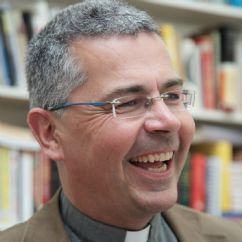Reflecting on a visit from Schools Consent Project
In our latest blog post, Teacher of English Mark Belassie-McCourt, discusses what happened when Schools Consen...
Read MoreFormer Chaplain, The Rev'd Canon Andrew Haviland, shares his thoughts on the importance of change.
 It always surprises me how so many people don't like change, with many thinking that keeping the status quo is the right way to go about things. We so often hear, 'If it is not broken don't fix it'. However, I do wonder how society would have managed to evolve if there hadn't been people who could embrace and look for change. Watching a repeat of Top Gear one evening, I saw Jeremy Clarkson talking to Ellen MacArthur, who was the guest in the 'Star in a Reasonably Priced Car' segment. He summed it up well:
It always surprises me how so many people don't like change, with many thinking that keeping the status quo is the right way to go about things. We so often hear, 'If it is not broken don't fix it'. However, I do wonder how society would have managed to evolve if there hadn't been people who could embrace and look for change. Watching a repeat of Top Gear one evening, I saw Jeremy Clarkson talking to Ellen MacArthur, who was the guest in the 'Star in a Reasonably Priced Car' segment. He summed it up well:
"What is it about some people that makes the human race so advanced? So many of us would still be in our caves saying, 'It is very nice here,' not wanting to go out and explore as it is quite comfortable here. If it wasn't for people like you wanting to explore, we would all be still in our caves eating deer and wearing fur."
It seems to me that embracing change is a vital part of our human development.
At school we are used to change. At this time of the year we start to prepare to welcome new pupils and colleagues into the school in September. This gives the place new energy, vision and opportunity. At the end of term we also say goodbye to those pupils and colleagues who move on to pastures new.
For those of us who remain, there are changes too. Pupils move year groups, new prefects are appointed, and our junior boys move to senior boys' boarding houses. For my colleagues exam boards change, schemes of work are altered, new colleagues are welcomed and we value the new insights and ideas that they will bring into how we can make Bryanston even better. As reflective practitioners we are constantly looking at how we can deliver what we teach more effectively. The motto 'et nova et vetera' is at the heart of how we operate.
The very basis of Christian living should be to embrace change as well. At times it can seem that new ideas and new ways of thinking are not welcomed: change seems to take an awful long time. The issue of women bishops in the Church of England is a case in point. And I for one thank God that at last we have a number of women who have been appointed to be the episcopate.
Being flexible and open to new ideas is something that I encourage pupils interested in being confirmed to do regularly. Good faith should be a living, dynamic, challenging and, at times, controversial way of life. Bad faith happens when one thinks one knows it all and is resistant to listening or embracing change. In his ministry Jesus criticised those who did not embrace new ideas and wanted to keep their feet firmly in the comfort of doing things as they have always been done.
We all recognise that change can be uncomfortable – going into the unknown can be unsettling – but that can be offset if we have around us a community who support and encourage conversation and recognise our anxiety. And at Bryanston we strive to do just that.